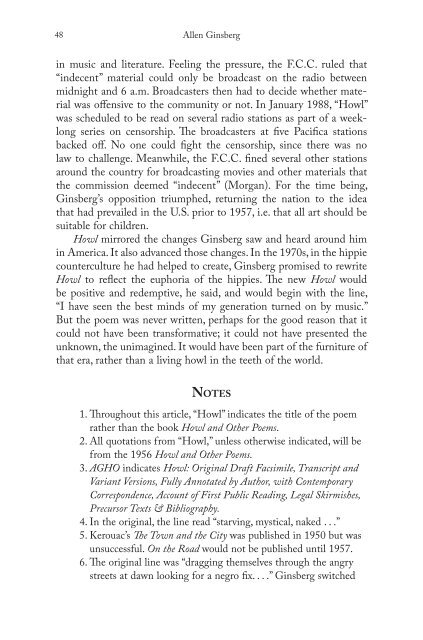Bloom's Literary Themes - ymerleksi - home
Bloom's Literary Themes - ymerleksi - home
Bloom's Literary Themes - ymerleksi - home
Create successful ePaper yourself
Turn your PDF publications into a flip-book with our unique Google optimized e-Paper software.
48<br />
Allen Ginsberg<br />
in music and literature. Feeling the pressure, the F.C.C. ruled that<br />
“indecent” material could only be broadcast on the radio between<br />
midnight and 6 a.m. Broadcasters then had to decide whether material<br />
was offensive to the community or not. In January 1988, “Howl”<br />
was scheduled to be read on several radio stations as part of a weeklong<br />
series on censorship. The broadcasters at five Pacifica stations<br />
backed off. No one could fight the censorship, since there was no<br />
law to challenge. Meanwhile, the F.C.C. fined several other stations<br />
around the country for broadcasting movies and other materials that<br />
the commission deemed “indecent” (Morgan). For the time being,<br />
Ginsberg’s opposition triumphed, returning the nation to the idea<br />
that had prevailed in the U.S. prior to 1957, i.e. that all art should be<br />
suitable for children.<br />
Howl mirrored the changes Ginsberg saw and heard around him<br />
in America. It also advanced those changes. In the 1970s, in the hippie<br />
counterculture he had helped to create, Ginsberg promised to rewrite<br />
Howl to reflect the euphoria of the hippies. The new Howl would<br />
be positive and redemptive, he said, and would begin with the line,<br />
“I have seen the best minds of my generation turned on by music.”<br />
But the poem was never written, perhaps for the good reason that it<br />
could not have been transformative; it could not have presented the<br />
unknown, the unimagined. It would have been part of the furniture of<br />
that era, rather than a living howl in the teeth of the world.<br />
NOTES<br />
1. Throughout this article, “Howl” indicates the title of the poem<br />
rather than the book Howl and Other Poems.<br />
2. All quotations from “Howl,” unless otherwise indicated, will be<br />
from the 1956 Howl and Other Poems.<br />
3. AGHO indicates Howl: Original Draft Facsimile, Transcript and<br />
Variant Versions, Fully Annotated by Author, with Contemporary<br />
Correspondence, Account of First Public Reading, Legal Skirmishes,<br />
Precursor Texts & Bibliography.<br />
4. In the original, the line read “starving, mystical, naked . . .”<br />
5. Kerouac’s The Town and the City was published in 1950 but was<br />
unsuccessful. On the Road would not be published until 1957.<br />
6. The original line was “dragging themselves through the angry<br />
streets at dawn looking for a negro fix. . . .” Ginsberg switched
















